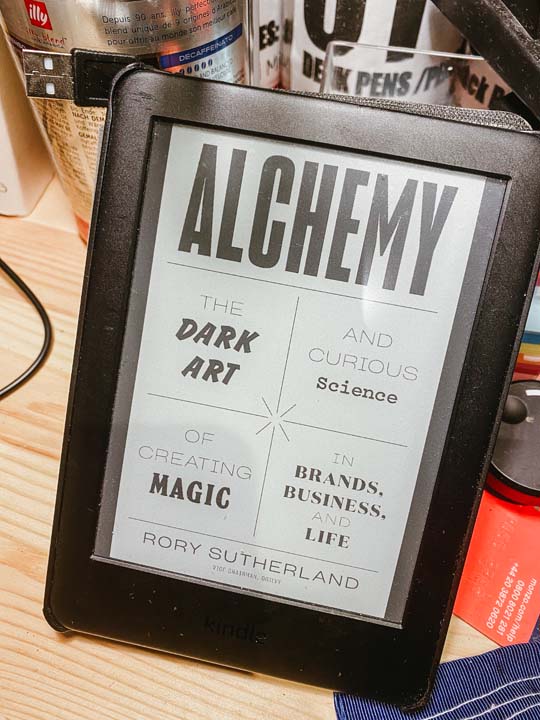Rory Sutherland
Alchemy by Rory Sutherland: When Logic Fails and Curiosity Wins
I first came across Rory Sutherland years ago, not through his book, but through his wonderfully quirky YouTube videos. If you’ve ever seen him speak, you’ll know what I mean. If not watch the video above. He is, to me, witty, sharp, full of strange but oddly brilliant ideas that make you tilt your head and think, “Wait, he’s kind of right.”
Those clips were my first nudge into exploring behavioural economics and human factors. The very areas that ended up shaping parts of my own professional journey when working in London. So, when I finally picked up his book Alchemy, I half-expected it to be a written version of his talks: clever, contrarian, and just a little bit bonkers. And I wasn’t wrong.
A Book Full of “Psycho-Logical” Magic
From page one, Alchemy feels like sitting in on one of Sutherland’s energetic rants (unlike a Kanye rant these actually make somewhat more sense, and so are) the good kind. Every chapter is packed with anecdotes, playful footnotes, and little bursts of wisdom about how humans actually behave (as opposed to how we think they should).
Sutherland makes a strong case for what he calls “psycho-logical” thinking: creative, irrational, and delightfully illogical ideas that often work better than purely rational ones. He argues that our obsession with logic and data blinds us to simple, human truths.
One of my favourite quotes from the book sums it up perfectly:
“It is much easier to be fired for being illogical than it is for being unimaginative. The fatal issue is that logic always gets you to exactly the same place as your competitors.”
That line hits hard if you’ve ever sat in a meeting where everyone nods along to the “safe” option even when you know it’s not the best one.
When Irrationality Wins
Sutherland’s examples are half the fun. He talks about Red Bull and how its strange, chemical taste actually helps sell it, because it signals “this must be powerful stuff.” He points out that the Uber app didn’t reduce wait times; it just made the waiting feel shorter by showing you where your driver is.
“The Uber map is a psychological moonshot, because it does not reduce the waiting time for a taxi but simply makes waiting 90% less frustrating.”
It’s little observations like that are so obvious once you see them and that make Alchemy such an enjoyable read (side note: I listen to part of this on my bike rides and the audiobook didn’t no disappoint as he narrates and brings all of his quirkiness through the headphones

The Trouble with Being Right (But Ignored)
Here’s the funny thing: while I found Sutherland’s arguments fascinating, I couldn’t shake a small dose of skepticism. He’s absolutely right about how irrational, creative thinking can lead to brilliant breakthroughs but will anyone in power actually take him seriously?
In most organisations, logic still rules. Or, as Sutherland puts it:
“Not everything that makes sense works, and not everything that works makes sense.”
People tend to choose what’s defensible over what’s imaginative. “No one gets fired for being rational” even if the rational choice is wrong. That reality leaves Sutherland’s message feeling a bit idealistic, even if it’s inspiring.
Even though Alchemy is often shelved as a marketing or advertising book, you don’t have to work in those worlds to enjoy it. I’m not a marketer myself, and yet I found it both entertaining and thought-provoking.
You’ll pick up little gems about human behavior, like why context shapes everything:
“Context is often the most important thing in determining how people think, behave and act.”
“why sometimes the weird, counterintuitive solution just might be the smartest one.”
Final Thoughts
If you go into Alchemy expecting a neat, logical framework, you’ll be disappointed. But if you go in with curiosity and an open mind, you’ll find plenty to chew on and maybe even catch yourself spotting bits of “psycho-logic” in everyday life.
It’s an easy, funny, and surprisingly deep-ish read especially if you’ve ever wondered why humans (yourself included) do such weird, wonderfully illogical things.
If you’re curious about why humans do weird things, this one’s worth a read or a listen on the. long day rides.